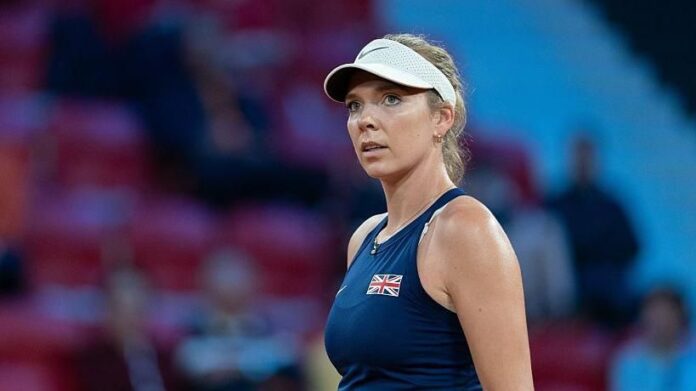Katie Boulter, Britain’s number two women’s tennis player, has recently made headlines for her brave decision to speak out about the “disgusting” online abuse and death threats she and her family have endured. In a candid interview with the BBC just days ago, Boulter shared screenshots of disturbing messages she received during and after her matches—some containing violent threats, others wishing her harm, and many referencing lost bets. Her revelations have shone a light on the dark side of professional sports, particularly the toxic intersection between social media, gambling, and athlete wellbeing.
Boulter, 28, is currently ranked 39th in the world and is well-known for her resilience on the court. However, the emotional toll of online harassment is something even the toughest competitors struggle to handle. Messages such as “Hope you get cancer,” “candles and a coffin for your entire family,” and “Go to hell, I lost money my mother sent me” are just a few examples of the abuse she has faced. The threats escalated during her first-round match at the French Open against Carole Monnet, a match she ultimately won despite the barrage of negativity.
The Reality of Online Abuse in Tennis
The scale of online abuse directed at tennis players is staggering. According to recent data from the Women’s Tennis Association (WTA) and the International Tennis Federation (ITF), approximately 8,000 abusive, violent, or threatening messages were sent to 458 players across social media platforms in 2024. A shocking 40% of these messages were traced back to disgruntled gamblers who lost money on matches, with one account sending 263 abusive messages alone.
For Boulter, the abuse is not only personal but also a source of anxiety for her loved ones. She described the chilling uncertainty of not knowing if the person sending the threats is nearby or if they have access to private information. “It just kind of shows how vulnerable we are,” she told the BBC. “You really don’t know if this person is on site, if they’re nearby, or if they know where you live or anything like that.”
The impact of this abuse is not limited to Boulter. She is deeply concerned about younger players who may not have the same coping mechanisms or support systems. “Youngsters really shouldn’t be seeing things like that or being sent things like that,” she said, referencing the explicit and violent content that often appears in direct messages.
How Tennis Authorities Are Responding
In response to the growing crisis, tennis governing bodies have launched initiatives to protect players. The Threat Matrix system, introduced in early 2024, uses AI and human analysts to identify and remove abusive content across major social media platforms. Over 1.6 million posts and comments were analyzed in the past year, with the most serious offenders—including 15 prolific accounts—referred to law enforcement.
The Betting and Gaming Council has also condemned the abuse, calling for social media companies to take swift action. Meta, the parent company of Instagram and Facebook, is reportedly developing tools to filter out offensive comments and images, but progress is slow and the volume of abuse remains high.
Despite these efforts, Boulter and her peers continue to face a relentless stream of negativity. The problem is compounded by the fact that abuse often follows both wins and losses, with gamblers lashing out regardless of the outcome. Boulter’s partner, Alex de Minaur, who is ranked 12th in the world, also experiences similar backlash, sometimes receiving hundreds of messages after matches.
The Emotional Toll on Katie Boulter and Fellow Athletes
Boulter’s experience is not unique, but her willingness to speak openly about it has sparked a broader conversation about athlete mental health. She described the difficulty of distinguishing between genuine threats and empty words, saying, “It really highlights our vulnerability.” The constant exposure to abuse has forced her to limit her engagement with direct messages, but the psychological impact is undeniable.
Reflecting on the message wishing her cancer, Boulter expressed disbelief: “I can’t fathom who would send something like that. It’s such a dreadful thing to say to anyone, let alone an enemy.” She has tried to respond with kindness in some cases, hoping to prompt reflection. Occasionally, abusers apologize, claiming they were caught up in the moment, but the damage is already done.
The abuse is not confined to major tournaments. Boulter anticipates an increase in toxic messages as she prepares for Wimbledon, where the stakes—and the scrutiny—are even higher. Both she and de Minaur expect to face backlash based on each other’s performances, highlighting the interconnected nature of abuse in the world of professional sports.
What Can Be Done to Protect Players?
The fight against online abuse in tennis is ongoing, but there are steps that can be taken to better protect athletes:
- Enhanced AI Detection: Continued investment in AI-driven tools to identify and remove abusive content.
- Stronger Industry Collaboration: Closer cooperation between social media companies, betting organizations, and tennis authorities.
- Player Education: Providing resources and support to help athletes cope with online harassment.
- Legal Action: Pursuing legal consequences for the most serious offenders, including account suspensions and referrals to law enforcement.
Boulter’s story is a powerful reminder of the human cost behind the headlines. While she continues to compete at the highest level, her courage in speaking out is helping to drive change and raise awareness about the need for a safer, more respectful online environment for all athletes.
A Call to Action for Fans and the Public
Katie Boulter’s revelations about the abuse she faces highlight a critical issue in sports today. Fans, social media users, and industry stakeholders must come together to create a culture of respect and support for athletes. If you witness online abuse, report it. If you’re a fan, remember that players are people too, and your words matter. Let’s stand with Katie Boulter and all athletes who deserve to compete without fear.
